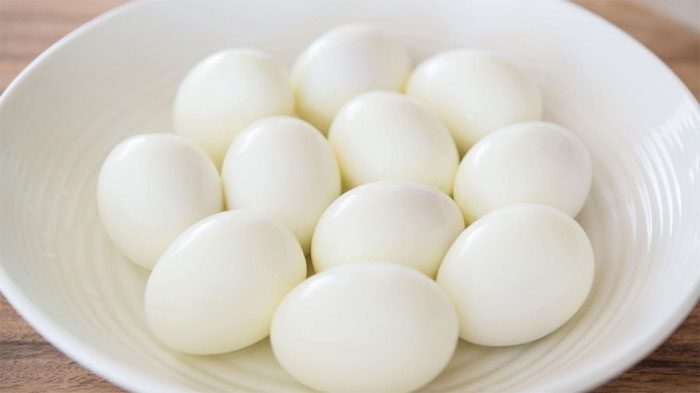Is it advisable to put boiled eggs in cold water to cool them quickly?
According to Master of Science Dr. Nguyen Van Tien from the Nutrition Communication Education Center at the National Institute of Nutrition, when boiled eggs are cooked, people often remove them and place them in cold water to cool them down quickly.

Cooling boiled eggs in cold water does not affect their quality.
This method not only makes peeling the eggs easier but also prevents the egg membrane from sticking to the egg white. As a result, the egg looks more appealing after peeling compared to those that are poorly shelled.
Soaking eggs in cold water after boiling helps make them easier to peel. (Illustrative image)
Placing hot eggs into cold water utilizes the physical principle of thermal expansion and contraction. When hot eggs encounter cold water, the egg membrane and egg white separate, but this does not affect the quality of the eggs.
Eggs are a highly nutritious food, containing essential nutrients such as protein, fat, calcium, iron, zinc, vitamin B12, vitamin D, saturated fatty acids, unsaturated fatty acids (both monounsaturated and polyunsaturated), and cholesterol.
The yolk and egg white have different degrees of digestibility. The egg white is harder to digest and assimilate due to the presence of antitrypsin, which inhibits digestive enzymes in the pancreas and intestines; this enzyme is destroyed when heated to 80ºC. The yolk, due to its emulsifying properties and even distribution of nutrients, is easily digested and absorbed whether eaten raw or cooked.
Lecithin in eggs helps regulate cholesterol levels, preventing cholesterol accumulation, promoting cholesterol breakdown, and facilitating the excretion of its components from the body. Eggs also contain a significant amount of cholesterol (600mg cholesterol per 100g of chicken egg), but there is a favorable correlation between lecithin and cholesterol. Therefore, lecithin plays a role in regulating cholesterol, preventing atherosclerosis (related to hypertension and cardiovascular diseases), and aiding in the removal of cholesterol from the body.
Dr. Nguyen Van Tien advises that egg yolks should be consumed in moderation: before the age of 40, one can eat 3 yolks per week; after 40, it is recommended to limit to 2 yolks per week. For those with lipid metabolism disorders, only 1 yolk per week is advisable. Children aged one year and older should consume 5-6 yolks per week.



















































